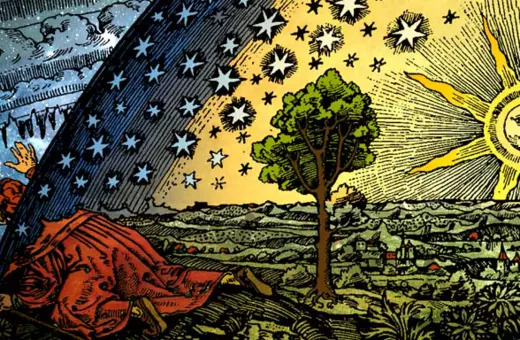“God is dead… And we have killed him”, writes Nietzsche. But Paul Atreides, Muad'Dib, lives. Frank Herbert’s Dune novels have made a blockbuster return with Denis Villeneuve’s latest film adaptation featuring Timothée Chalamet. And where Dune returns, Nietzsche returns with it, and in particular, Nietzsche’s critique of the power of religion, writes Kevin S. Decker.
Frank Herbert’s Dune is a space opera treasure trove, and its sequels show it to also be a Pandora’s Box of long games and latent surprises. Director Denis Villeneuve’s latest adaptation of the Duniverse, released in 2021, allows us to explore so many things—survival, honor, deep ecology, strategy, weird psychic and physical capabilities, psychology, gender, prophecy, religion. In particular, it showcases how cultures retain traces we recognize despite their mutation over millennia—the stories of the great houses of the Landsraad, the Emperors, and the God Emperor unfurl over a jaw-dropping sixteen thousand years’ span of time.
Even that far in the future, the human race’s survival depends on whether they take advantage of what the past has sedimented in human nature and consciousness—group memories, rituals, responsiveness to the environment. Herbert’s focus on humans as historical beings parallels certain traditions of Western philosophy since Georg W.F. Hegel. His idealism and its later offshoots—existential phenomenology, existentialism, hermeneutics and pragmatism (among others) spotlights our categories for thinking about the world not as timeless, a priori features of minds like ours, but instead as things that have histories that we ignore at our peril.
 SUGGESTED READING
Science fiction is philosophy
By Lisa Walters
SUGGESTED READING
Science fiction is philosophy
By Lisa Walters
A religion, whatever else it might be, is both a thing with a history as well as a structure for thinking about the world’s beginning and ending and all the laws and values that suspend the universe between origin and its final acts. The histories and structures of world religions had been of interest in Europe since the first part of the nineteenth century, when Arthur Schopenhauer—a bitter rival of Hegel—incorporated ideas from newly translated Sanskrit Hindu sacred texts into his work and David Friedrich Strauss initiated the academic “historical Jesus” movement in his 1835 book The Life of Jesus, Critically Examined—whose ideas, intriguingly, seemingly infuriated everyone, but none more so than followers of Hegel like Bruno Bauer and, surprisingly, a young philologist named Friedrich Nietzsche.
___
The constant specter in Nietzsche’s work that must be confronted is nihilism, the belief that life is meaningless if religious and moral principles are not absolutely true
___
From the very first of his writings, Nietzsche’s work on philosophy, music and tragedy in ancient Greece bent towards cultural criticism. His criticisms of The Life of Jesus center on the idea that Strauss does nothing more than offer new (Darwinian) reasons for supporting antiquated (Christian) beliefs, so he avoids the difficult work of creating new values for a new world. Similarly, Nietzsche’s first book The Birth of Tragedy out of the Spirit of Music, published in 1872, pipes the praises of tragedy as a coping mechanism in Greek culture before the leavening effect of Plato’s philosophy, while at the same time suggesting that a decadent and culturally exhausted Germany might create its own paths for tragic coping from cues in the music and drama of Richard Wagner. The constant specter in Nietzsche’s work that must be confronted is nihilism, the belief that life is meaningless if religious and moral principles are not absolutely true.





















Join the conversation